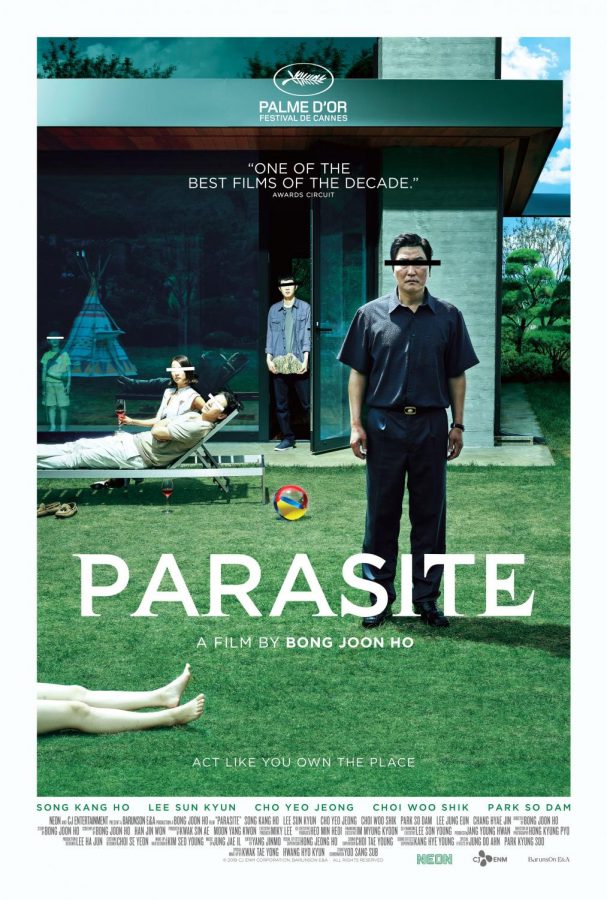The Foreign Champion
“Parasite” is a shining example of how good filmmaking transcends language
February 19, 2020
For all the people talking about the fuss “Parasite” made at the Academy Awards, I’ve been hard-pressed to find people in the area who have actually seen it. I’m not terribly surprised by this; at this point, the Oscars only really serve as another avenue to gawk at celebrities, rather than a way to acknowledge some of cinema’s best work of the previous year. Although I’m generally not interested in the Oscars, I’m very well aware of the influence it has over the industry and the types of movies that get mainstream attention. If there was ever a movie deserving of that attention, “Parasite” would definitely be it. It’s not only wildly entertaining, but a gateway to foreign cinema that proves good filmmaking is capable of surpassing the thickest of language barriers.
The film’s core conflict is between two families, the Kims and the Parks. The Kim family lives in a dirty half-basement, subsisting only on the wifi of nearby businesses and the petty cash received from folding mass quantities of pizza boxes. The Park family, in contrast, is a picturesque upper-class family. They live in a massive, pristine house-designed by a world-renowned architect-and act as if money isn’t even remotely an issue when living their lives. Through connections with a friend (and a heaping helping of forgery), the son of the Kims, Ki-Woo, becomes an English tutor for the Park family’s daughter. The movie then follows the rest of the Kim family’s effort to integrate themselves into the Park household, through excessive amounts of deception, quick thinking and eavesdropping.
Although the movie blends bits and pieces from various genres, “Parasite” is, at its core, a heist movie. If you are at all familiar with how most heist films are structured, you know a good chunk of the running time will be devoted to establishing a plan, whether that means laying out the steps or describing the target. In standard heist movie fashion, each member of the Kim family has a specific skill tied to them that allows them to effectively worm their way into the Park household. Although these heist-hallmarks are present, the director Bong Joon-ho has presented them in an extremely creative and subtle way. Rather than seeing an outright set-up, we see the Kim family’s scheme play out in real time, giving the story a wonderful amount of unpredictability. A great deal of the enjoyment I got out of the movie was from watching the story go in directions I could have never anticipated, which is something that happens rarely.
Not only does the film have an engaging story, but it looks and sounds absolutely gorgeous. All of the locations and sets have a distinct mood and texture attached to them, whether that be the sharp, clinical look of the Park estate or the dingy city street above the Kims’ half-basement dwelling. The score features a lot of classical music, which is fitting, as it is often associated with the wealthy and affluent.
An element of the film that I have come to greatly appreciate is the fact it is able to convey a clear, powerful message without a hint of condescension. The concept of social stratification has been portrayed in countless works of fiction, but I have yet to encounter any piece of media that has portrayed this idea with as much balance as “Parasite” has. Neither family is portrayed as entirely likable or entirely despicable; both are given a fair amount of strengths and weaknesses. The Kims, as charming as they may be, are unapologetic con-artists. The film does not downplay their manipulation of the Park family, but instead makes an effort to frame their actions against a background of poverty. Their crimes are born out of desperation rather than greed. Likewise, the Parks are not characterized as elitist monsters, as many lesser movies are prone to do when depicting the wealthy. This balance is what leaves the movie feeling far more genuine and interesting than the standard “Prince and the Pauper” stories audiences have become far too familiar with. It offers the best kind of message, one that compliments the story being told instead of completely motivating it. Even if it wasn’t present in the film at all, it would still remain as a tightly-constructed thriller with excellent characters and top-notch presentation.
If there’s one thing I want you to take away from this article, it’s that foreign media is not as inaccessible as you might think. While subtitles may be a hurdle for some people to overcome, it’s well worth it to experience unique and inspired pieces of cinema. In a time where movies feel more disposable and dumbed-down than ever before, sometimes a little outsourcing is all you need to find something worth watching. Hopefully the success that “Parasite” has experienced opens up the door for foreign films to gain a larger foothold in the states. If you give the film a chance, I swear you won’t regret it.


















